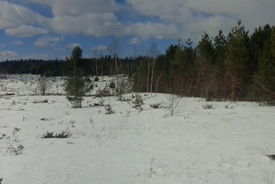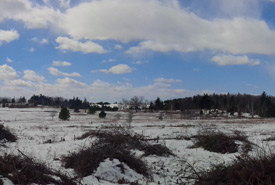Progress on the Rice Lake Plains!

Stewardship progress on the Rice Lake Plains, ON (Photo by NCC)
The Hazel Bird Nature Reserve in Northumberland County, Ontario is a key property for grassland birds and tall grass prairie habitats. One threat on this property includes invasive species such as the Scotch pine seen in the photograph.
Scotch pine was planted in the 1940 to 1970 to stabilize the sandy soil and reduce erosion. Early pioneers removed the tall grass prairie that held the soil and tried farming the land, which was largely unsuccessful.
Today regenerating Scotch pine fills in open areas and outcompetes native plants and harms the species that depend on this unique habitat. Stewardship activities involve removing Scotch pine using volunteers, staff and contractors.
In this picture to the right (click to enlarge and view a panoramic shot), the monoculture Scotch pine is present on the far right hand site of the picture. Winter removal of Scotch pine has taken place in the foreground, through a mechanical harvester, leaving open grassland habitat behind. Small scattered Scotch pine still exist. They will be removed in the spring and through the coming years and planting of tallgrass species will occur to ensure the meadow doesn’t revert to a species poor Scotch pine monoculture.



